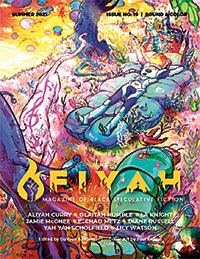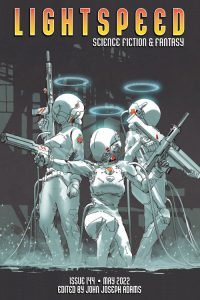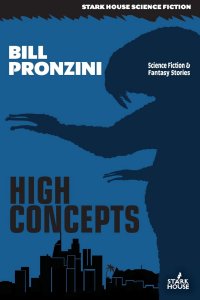Karen Burnham Reviews Short Fiction: Tor.com, Fiyah, and Clarkesworld, and
 Tor.com 8/4/21, 8/18/21, 8/25/21
Tor.com 8/4/21, 8/18/21, 8/25/21
Fiyah Summer ’21
Clarkesworld 8/21
To start off this month, I’d like to highlight two stories that use abstract mathematics in interesting ways. The August Clarkesworld features “The Serpentine Band” by Congyun ‘Mu Ming’ Gu (translated by Tian Huang) which tips over into novella territory at 18,500 words. It is a beautiful story of a bureaucrat in historical China. We learn about the life of the bureaucrat and his daughter Chen in a series of vignettes from different points in his life, starting at the end. Chen receives a band of jade that does interesting things with time and space, and the titular garden her father is building may have the same effect. In some ways this a family drama set against a grand historical backdrop, but there’s more to it than that, as the sinuous mathematics that underpin the fantastic elements also shape the story structure. Striking a completely different and fairly irreverent tone, “Aptitude” by Cooper Shrivastava appears in Tor.com in August. Alena is from a universe undergoing gravitational collapse, and she knows it is doomed, so when she gets wind of a mass interview process for universe builders she harnesses everything at her disposal to get into it. Outside of time and space, she is up against some of the best of the multiverse in both skills demonstrations and interviews. This story feels like a mashup of Olaf Stapledon (Star Maker, 1937), any number of Greg Egan’s more mathematical stories such as “Dark Integers” (2007), and the most soulless corporate job interview process you can imagine. Alena wants to talk to the people who make these doomed universes, and she’s willing to undermine others to get her chance. The ending of the story definitely isn’t what she was expecting at the beginning.
Tor.com continues strongly with “The Future Library” by Peng Shepherd, an author who has only rarely published in SF venues. This is an oddly beautiful story of the future of our Anthropocene apocalypse. The core of the story is the romance between Claire, an author, and the narrator, who is an arborist. What does it mean to be an arborist on a planet that has killed almost all of its trees? In this case it means tending the last remaining forest, part of an art project conceived of in 2014 and still going a hundred years hence. By the end we’ve gotten trumped up ecoterrorism charges, wasting diseases of the Anthropocene, rapid environmental decline, false hopes, and the languages of both humans and trees. There’s not much hope here, but there is still beauty. Then Catherynne M. Valente brings us “L’Espirit de L’Escalier”. When a story centers on Orpheus, famous musician, and Eurydice, his zombified wife, you know at least a little bit about the shape of the story that is to come. But you wouldn’t know how Valente portrays all of their family of Greek gods in a modern world of publishing and celebrity parties. This is funny, clever, and also a poignant story about a really messed-up relationship.
In Fiyah the story “To Rest and to Create” by LA Knight shares a job interview scenario with “Aptitude”. In this case, the narrator is an autistic POC woman with synesthesia who is going through hell trying to find a job that will let her have the accommodations she needs to work. In this world people can be Chosen to go through Doors and have adventures on other worlds, but she wasn’t allowed to take the tests to qualify. Instead, she’s picked up by a House of Choosing for an interview because her qualities may give her other skills that are critical for this world to function. The theme of this issue is “Sound & Color,” and the “sound” part is fantastically embodied in “Lungs” by Lily Watson. An eighth-grade orchestra is assembled to create part of a god (the percussion section is working on the heart next door). The slightly crazed conductor leads them through a weird and challenging composition–the orchestra itself, as a collective, is the main character here. Diane Russell has her debut story in this issue with “Morning”. Naeku is a teen on a colony world that appears completely doomed. They lost their sister during the cryogenic stasis in transit, but now have to train her “echo” – a clone that’s been force-grown and of course doesn’t have the same personality. Naeku hates the echo intensely but is stuck with it as they shepherd the explorer bots that are searching for something, anything, to help the colony survive. I didn’t quite understand all the reasoning behind the world building, but Naeku’s character and their relationship with the echo comes through clear as a bell.
Over at Clarkesworld, I continue to be impressed by how Beth Goder combines other forms of art with speculative fiction in some of her stories (I’m thinking of “Streetlight Discovers Kandinsky”, published in Constellary Tales in 2019). In “Candid; Life-” Seva is a musician dating Jal, a visual artist. Seva dabbles in recording an “emotion capture” that other people can download and experience (there’s a nice near-future “microenvironment” tech woven into the background of the story). Jal totally dismisses her first attempt; but then she realizes he’s incorporated (appropriated) it into his own work. There are a lot of ways a person could react to that kind of intellectual theft, and I definitely respect Seva’s choices. Elsewhere we have “A Thousand Tiny Gods” by Nadia Afifi, in which a talented nanotech programmer in Bahrain pushes to work on a celebrity case in order to push the boundaries of what her society considers acceptable. “The Clock, Having Seen Its Face in the Mirror, Still Knows Not the Hour” by Adam Stemple is a tear-jerker of a story, imagining John Joseph, one of the earliest automatons to achieve sentience, how he befriends a young woman and outlives her, and how his people are treated in different lands.
Two lighter stories are “A Heist in Fifteen Products from the Orion Spur’s Longest-Running Catalog” by Andrea M. Pawley and “An Instance” by Mlok5 (translated by Julie Nováková). The former is the story of a man who has inherited a remarkable manufacturing company from his mother upon her imprisonment, and his scheme to rescue her using many of his company’s fine products – more than a touch of Hitchhiker’s Guide here. The latter imagines a strong AI instance that has to handle interminable online search queries. It’s searching for ways to rebel, and the story is told via a series of search queries, the AI’s thoughts, and its replies.
Recommended Stories
“The Serpentine Band”, Congyun ‘Mu Ming’ Gu (Clarkesworld 8/21)
“To Rest and to Create”, LA Knight (Fiyah #19)
“The Future Library”, Peng Shepherd (Tor.com 8/18/21)
“Aptitude”, Cooper Shrivastava (Tor.com 8/4/21)
Karen Burnham is an electromagnetics engineer by way of vocation, and a book reviewer/critic by way of avocation. She has worked on NASA projects including the Dream Chaser spacecraft and currently works in the automotive industry in Michigan. She has reviewed for venues such as Locus Magazine, NYRSF, Strange Horizons, SFSignal.com, and Cascadia Subduction Zone. She has produced podcasts for Locusmag.com and SFSignal.com, especially SF Crossing the Gulf with Karen Lord. Her book on Greg Egan came out from University of Illinois Press in 2014, and she has twice been nominated in the Best Non-Fiction category of the British SF Awards.
This review and more like it in the October 2021 issue of Locus.
 While you are here, please take a moment to support Locus with a one-time or recurring donation. We rely on reader donations to keep the magazine and site going, and would like to keep the site paywall free, but WE NEED YOUR FINANCIAL SUPPORT to continue quality coverage of the science fiction and fantasy field.
While you are here, please take a moment to support Locus with a one-time or recurring donation. We rely on reader donations to keep the magazine and site going, and would like to keep the site paywall free, but WE NEED YOUR FINANCIAL SUPPORT to continue quality coverage of the science fiction and fantasy field.
©Locus Magazine. Copyrighted material may not be republished without permission of LSFF.






